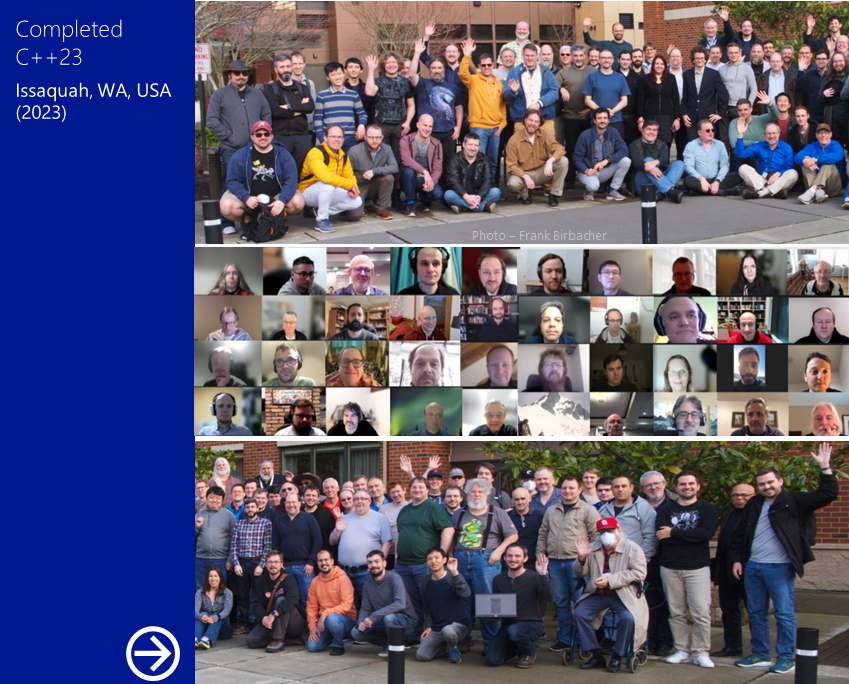On Saturday, the ISO C++ committee completed technical work on C++23 in Issaquah, WA, USA! We resolved the remaining international comments on the C++23 draft, and are now producing the final document to be sent out for its international approval ballot (Draft International Standard, or DIS) and final editorial work, to be published later in 2023.
Our hosts, the Standard C++ Foundation, WorldQuant, and Edison Design Group, arranged for high-quality facilities for our six-day meeting from Monday through Saturday. We had about 160 attendees, more than half in-person and the others remote via Zoom. We had 19 nations formally represented, 9 in-person and 10 via Zoom. Also, at each meeting we regularly have new attendees who have never attended before, and this time there were 25 new first-time attendees in-person or on Zoom; to all of them, once again welcome!

The C++ committee currently has 26 active subgroups, 13 of which met in parallel tracks throughout the week. Some groups ran all week, and others ran for a few days or a part of a day and/or evening, depending on their workloads. You can find a brief summary of ISO procedures here.
From Prague, through the pandemic, to an on-time C++23 “Pandemic Edition”
The previous standard, C++20, was completed in Prague in February 2020, a month before the pandemic lockdowns began. At that same meeting, we adopted and published our C++23 schedule… without realizing that the world was about to turn upside down in just a few weeks. Incredibly, thanks to the effort and resilience of scores of subgroup chairs and hundreds of committee members, we still did it: Despite a global pandemic, C++23 has shipped exactly on time and at high quality.
The first pandemic-cancelled in-person meeting would have been the first meeting of the three-year C++23 cycle. This meant that nearly all of the C++23 release cycle, and the entire “development” phase of the cycle, was done virtually via Zoom with many hundreds of telecons from 2020 through 2022. Last week’s meeting was only our second in-person meeting since February 2020, and our second-ever hybrid meeting with remote Zoom participation. Both had a high-quality hybrid Zoom experience for remote attendees around the world, and I want to repeat my thanks from November to the many volunteers who worked hard and carried hardware to Kona and Issaquah to make this possible. I want to again especially thank Jens Maurer and Dietmar Kühl for leading that group, and everyone who helped plan, equip, and run the meetings. Thank you very much to all those volunteers and helpers!
The current plan is that we’ve now returned to our normal cadence of having full-week meetings three times a year, as we did before the pandemic, but now those will be not only in-person but also have remote participation via Zoom. Most subgroups will additionally still continue to meet regularly via Zoom.
This week’s meeting
Per our published C++23 schedule, this was our final meeting to finish technical work on C++23. No features were added or removed, we just handled fit-and-finish issues and primarily focused on finishing addressing the 137 national body comments we received in the summer’s international comment ballot (Committee Draft, or CD). You can find a list of C++23 features here, many of them already implemented in major compilers and libraries. C++23’s main theme was “completing C++20,” and some of the highlights include module “std”, “if consteval,” explicit “this” parameters, still more constexpr, still more CTAD, “[[assume]]”, simplifying implicit move, multidimensional and static “operator[]”, a bunch of Unicode improvements, and Nicolai Josuttis’ personal favorite: fixing the lifetime of temporaries in range-for loops (some would add, “finally!”… thanks again for the persistence, Nico).
In addition to C++23 work, we also had time to make progress on a number of post-C++23 proposals, including continued work on contracts, SIMD execution, and more. We also decided to send the second Concurrency TS for international comment ballot, which includes hazard pointers, read-copy-update (RCU) data structures… and as of this week we also added Anthony Williams’ P0290 “synchronized_value” type.
The contracts subgroup made further progress on refining contract semantics targeting C++26.
The concurrency and parallelism subgroup is still on track to move forward with “std::execution” and SIMD parallelism for C++26, which in the words of the subgroup chair will make C++26 a huge release for the concurrency and parallelism group.
Again, when you see “C++26” above, that doesn’t mean “three long years away”… we just closed the C++23 branch, and the C++26 branch is opening immediately and we will start approving features for C++26 at our next meeting in June, less than four months from now. Implementers interested in specific features often don’t wait for the final standard to start shipping implementations; note that C++23, which was just finished, already has many features shipping today in major implementations.
The newly-created SG23 Safety and Security subgroup met on Thursday for a well-attended session on hitting the ground running for making a targeted improvement in safety and security in C++, including that it approved the first two safety papers to progress to review next meeting by the full language evolution group.
Thank you to all the experts who worked all week in all the subgroups to achieve so much this week!
What’s next
Our next two meetings will be in Varna, Bulgaria in June and in Kona, HI, USA in November. At those two meetings we will start work on adding features into the new C++26 working draft.
Wrapping up
Thank you again to the approximately 160 experts who attended on-site and on-line at this week’s meeting, and the many more who participate in standardization through their national bodies!
But we’re not slowing down… we’ll continue to have subgroup Zoom meetings, and then in less than four months from now we’ll be meeting again in Bulgaria to start adding features to C++26. I look forward to seeing many of you there. Thank you again to everyone reading this for your interest and support for C++ and its standardization.